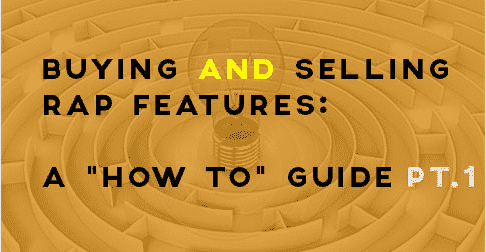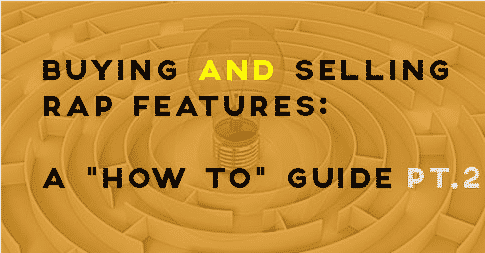Hey guys, this is Daniel from The Corporatethief Beats. This is episode 14 of the Mixtape Marketing Podcast. I’m very pleased to introduced TJ Bear from MindUnderMohawk.com. TJ is a brand and web designer from music artists/music industry professionals at Mind Under Mohawk. He is also an independent hip hop artist. In this episode of the mixtape marketing podcast, we are going to dive into discussions on buying and selling rap features.
[sociallocker id=”1578″]
[/sociallocker]
1. TJ, can you give us a brief description of what you do for artists?
I do a lot of things. I try to consider myself think of it as an umbrella term to call it “musicpreneur”. I’m like combining entrepreneur and a music industry career. But essentially, I am an independent artist myself. And I’m also a brand and web designer for other independent artists and professionals at work in the music industry and small businesses. That umbrella which is under my freelance company, Mind Under Mohawk, I do a lot of different things mostly brand web design. I do copywrite, content for websites and blogs. I do consultation services. I do quick advice sessions or strategic planning sessions, mostly with artists but sometimes with other industry professionals and small businesses as well. So that’s the overview of most the things I do.
2. The reason why I brought TJ on today’s podcast is that I found an article that is closely related to his articles on mindundermohawk.com and its to do web playing and selling rap features. I’m really excited to talk about this topic ‘coz it’s something that I am not familiar with but I’d love to introduce it to the audience. When you’re talking about this topic, as a rule of thumb, every situation is unique and everyone’s situation is not the same. So there’s a different medium for each artist. Maybe you can talk about it.
Sure. When it comes to the music industry, there are a million things that are working and not working for different people at all times. There’s no really one narrow strategy to every situation in every artist that’s going to work. It’s really important to way out the different types of options you have and figure out what specific strategy works best for your own career.
3. Maybe you can talk about the importance of having a brand before getting out there.
Branding is one of the most important foundational steps in artists’ career that seems to get neglected. A lot of times artists will worry about getting content and music out there networking long before they have their branding solidified and strategy in place.
I think it’s a mistake a lot of artists make, something that slows a lot of artists down. Even if you have your branding, your branding could end up changing over time. It won’t necessarily be the same as it is now 3 years from now. It goes through a constant refinement process. You have a good social media presence.
You have good artwork. You have good quality photos. You have a logo. You have a website. You have all this foundational stuff that altogether creates a professional image. The image stands out against the saturated sea of artists who don’t have that.
4. Do you think that artists are kinda relying on the free resources, such as social media, that are online too much?
Absolutely, especially with regards to social media. Myspace used to be a huge player for independent artists a decade ago. Facebook is constantly reducing the organic reach of pages for artists. SoundCloud is way popped out of the landscape is a really good tool.
It’s really important to be leveraging social media but it’s also as important as understanding you can’t predict where that landscape is going to go. So your social media presence should serve as a tool to funnel traffic your audience or users back to something that you can control. Your own website, your email these mediums and these platforms that you control and no one can take them away from you.
5. Getting back to rap features, you say that you always facepalm when a rapper refuses to pay or those who think they are bigger to pay for rap features. What do you think of artists who are like that?
I’m not saying that it’s a decision to make if you are choosing not to buy rap features from other artists. But when you adopt that kind of close-minded strategy that you’re unwilling to change, you might miss an opportunity that’s really big for your career.
6. What are the actual benefits of getting people to feature your records?
The obvious benefit when it comes to collaborating with other artists, whether there’s payment involved or not, is sharing exposure to your audiences and your fanbase. When you collaborate with other artists, they are pretty much giving you access to their fanbase because fans nowadays are cluttered with so many decisions.
7. What kind of research should artists be doing?
When it comes to investing money in your career, you always wanna make sure that are spending your money on what you think you’re gonna get the best return. You just wanna be strategic about everything. When it comes to investing a rap feature for an artist, you just wanna know what other artists that invested that feature in the past. Look at 5 different artists. Compare their exposure, fan base and rates. Just decide on what’s best for you.
8. When an artist buys a feature of a well-known artist, are they selling them the exclusive rights to that song? Or is it different in every situation?
It’s different in every situation. When you’re buying from a more established artist, especially if there’s a record label involvement, there’s definitely a lot more legality involved especially when it comes to royalties.
But for the most part, especially in hip hop, usually you’re paying an artist for a feature, you’re gonna be the one owning the rights to that master. It’s like a work for hire. But there are situations wherein that’s not the case.
A reputable feature combined with a good press campaign strategy and a well-formulated lp pitch can help you a lot.
9. What can you say about artists who give away features for free? When should they start charging? What can you suggest to artists who want to charge for features?
I think it is a very important part of their career, but I think they should give it a lifespan. They should spend a good amount of time to figure out what particular amount that suits for your career. They should research at similar artists and see what they’re doing. But if you think that your offer is fair and appropriate, people will always pay for it.
10. You said that it is a good idea to go out there and get advice from artists that are a step ahead of you. Maybe you can talk about that.
When it comes to the music industry, everything is negotiable. There are not any rule books. When trying to negotiate features with other big artists and other matters, I’ve found out that people will always ask money more than they can settle on. You have always had to see how much bargain power you have in every situation.
11. What can you say to artists who are in a situation wherein they need legal representation, specifically when the situation involves a lot money.
When it comes to situations that require long term contracts or involve a lot of money, you may wanna research and learn as much as you can. And consider seeking outside counsel if necessary.
12. What kind of mistakes do artist do over and over again? What kind of advice can you give them?
Make sure your branding is on point. Your web presence is on point. You have the strategy and you have documented plans. You’re making music. You have a press kit. You’re playing shows. Target high-value connections. Networking and mutual connections are beneficial.





